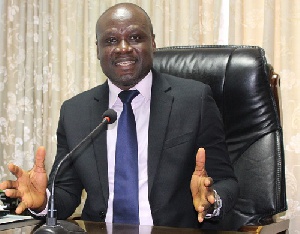 Mark Badu-Aboagye, CEO of Ghana National Chamber of Commerce and Industry
Mark Badu-Aboagye, CEO of Ghana National Chamber of Commerce and Industry
Even though businesses globally have had their share of the effects of the COVID-19 pandemic, a survey conducted by the Ghana National Chamber of Commerce and Industry has established that the most hit businesses in Ghana are in the SME sector.
CEO of Ghana National Chamber of Commerce and Industry, Mark Badu-Aboagye, in his contribution to B&FT’s online forum, ‘Ghana’s Most Respected CEOs’, said anxiety is high in the SME sector due to the pandemic.
The anxiety, he noted is surrounded by factors such as income reduction, job security for employees, personal safety and family and domestic uncertainties, situations that according to him makes it difficult for people to determine what could happen in the near future.
“The effect of this pandemic is just obvious for everybody to know. We realised that even within the businesses, the effects on SMEs and the big businesses are not the same. We did a survey and we realised that the SMEs are really hard hit with this pandemic.
And because they don’t have the financial muscle to survive over a long period of time, with the reduction in their revenue and increasing cost, most of them have collapsed. And once the businesses are not there, it means the employees and the workforce are also at home, and so the anxiety within the SME sector is high,” Mr. Badu-Aboagye said.
The Most Respected CEOs breakfast series webinar, which was held under the theme ‘Managing an Anxious Workforce During and Post COVID-19 for Business Continuity’, hosted human resource management experts including Hannah Ashiokai Akrong, HR Director for Vodafone Ghana, Roland Teye, Head of Consulting at Deloitte Ghana, and Dr. Hazel p. Berrard Amuah who is a HR and Leadership consultant.
In his submission, Mr. Badu-Aboagye also implored HR practitioners of organisations to ensure that organisations achieve their objectives and to motivate staff and the workforce to be able to contribute positively, emphasizing the need for the use of effective communication and transparency.
Business continuity planning, and practicing risk mitigation measures, he noted must also be taken seriously in organisations. “It is about time that we accommodate some of these current situations into our HR policies and procedures to ensure that we give some level of assurance to our workforce he added.”
Also regarding job security, Vice President of the Association of Ghana Industries, and CEO of RedMoon Resources, Humphrey Kwesi Ayim-Darke who also joined the conversation via Zoom, stated that encouraged organisations to have in-debt analyses of their continuity plans to ensure employees’ job security in times of crisis.
“The impact of COVID-19 on most enterprises has been severe, and if the business continuity plan is not in-debt in terms of analyses- bringing all assumptions unto the table, it could threaten the survival of an enterprise and therefore the probability of the job security of most of the employees.”